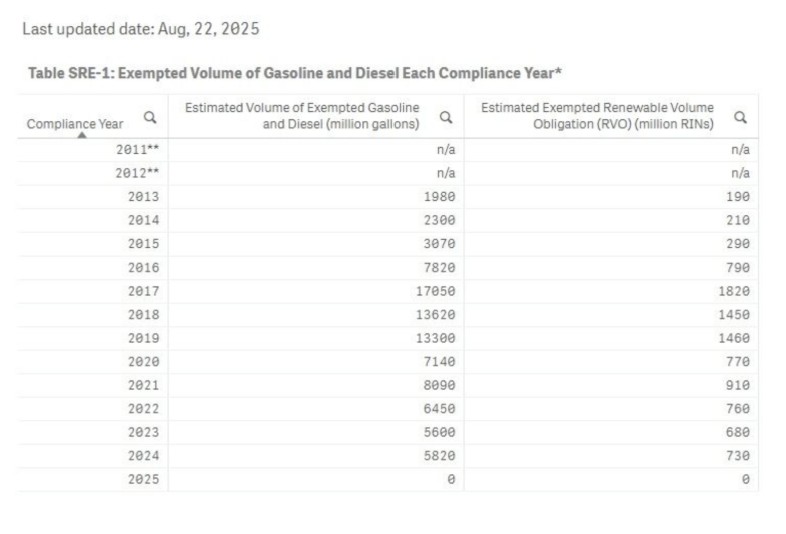The EPA has taken decisive action on a backlog of 175 Small Refinery Exemption (SRE) petitions submitted by 38 small refineries spanning the 2016–2024 compliance years. The EPA’s move is expected to bring clarity and momentum to the Renewable Fuel Standard (RFS) program’s SRE problem.
Breakdown of EPA’s Decisions
After careful review in consultation with the Department of Energy (DOE), EPA delivered the following outcomes:
- Full exemptions: granted: 63 petitions
- Partial exemptions: granted: 77 petitions
- Denied: 28 petitions
- Determined ineligible: 7 petitions

Source: US EPA
EPA also reaffirmed a policy that began in the first Trump administration (2020 RVO rule), applying partial (50%) exemptions when a small refinery demonstrates partial economic hardship
RIN Credits & Market Stability
In addition, the EPA provided clarity on how retired RINs will be handled. When a refinery is granted an exemption, any previously retired RINs used for compliance will be restored. These RINs still carry their standard two-year lifespan and can be applied retroactively. Importantly, this process won’t affect the number of RINs available for 2024 or future compliance years, nor will it reduce overall biofuel demand.
Mixed Industry Response
While the move resolves the SRE backlog, stakeholders remain cautiously optimistic:
Clean Fuels Alliance America expressed concern that returning RINs could undermine markets for biodiesel, renewable diesel, sustainable aviation fuel (SAF), and related feedstocks. Kurt Kovarik, Clean Fuels’ Vice President of Federal Affairs, stated, “EPA’s announcement conflicts with its consistent finding that small refiners are not facing disproportionate economic hardships from RFS compliance. Refunding retired RINs has the potential to undercut current markets for domestic biodiesel, renewable diesel, and SAF as well as for American oilseed crops and other feedstocks. This announcement comes just as farmers begin planning to harvest the year’s soybean crop, which is expected to achieve a record-setting yield. We urge EPA to ensure that small refinery exemptions do not undermine the market for farmers and clean fuel producers.”
“We are grateful to see EPA take action addressing the extensive backlog of small refinery exemptions,”said Michael McAdams, president of the ABFA. “ABFA is also pleased that the agency plans to prepare a supplemental proposed rule for the reallocation of the exempted volumes for those years where compliance is yet to be demonstrated as well as how to account for exemptions in future years.”
How RINSTAR Can Help
As the EPA clears the backlog of SRE petitions and updates its policies on exemptions and RIN credits, it’s clear that RFS compliance will continue to evolve. For obligated parties, having a reliable partner is essential. RINSTAR provides the compliance expertise and tools, like our automated PTD creator, file upload feature, and compliance dashboards, to simplify RIN management.
👉 Discover how RINSTAR makes RFS compliance easier
Stay Informed
The EPA’s recent action on Small Refinery Exemptions is just one example of how quickly policies can shift under the Renewable Fuel Standard. To keep your business ahead of the curve, subscribe to our newsletter and follow our blog for updates on:
- Supplemental EPA rulemakings and future SRE policy changes
- 45Z Clean Fuel Production Credit implementation
- Carbon intensity scoring and GREET model developments
- Renewable fuel tax planning and compliance strategies
Have questions about how these changes may impact your compliance obligations?
📩 Contact us at services@cfch.com or schedule a personalized RINSTAR demo today.
